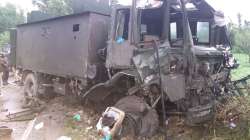Day after Pakistan alert, 9 soldiers injured in vehicle-borne IED attack in Pulwama
Nine army jawans were injured after terrorists targeted a vehicle with an IED blast in Jammu and Kashmir's Pulwama district on Monday.

Nine army jawans were injured after terrorists targeted a vehicle with an IED blast in Jammu and Kashmir's Pulwama district on Monday.
The incident happened on Arihal-Lassipora Road in South Kashmir. The terrorists targeted a mobile vehicle patrol of 44 Rashtriya Rifles with a vehicle-based IED while the army patrol was moving in Arihal district on Monday evening.
The injuries suffered by the jawans are minor. Damage was minimised due to the alertness of the patrol party.
The attack on the army vehicle by exploding an IED placed inside a car comes just a few days after Pakistan shared an intelligence input with India that terrorists were planning to carry out a vehicle-based explosive attack on security forces in south Kashmir.
The input had said Al Qaeda terrorists were planning to avenge the killing of Zakir Musa, chief of Ansar Ghazwatul Hind (AGH), a proclaimed Al-Qaeda affiliate, by the security forces.
Following the attack, reinforcements of security forces immediately reached the explosion site and cordoned off the area for searches. Security forces also launched a manhunt to locate the owner of the explosive-laden car.
"Investigation has been started in this incident. The owner of the car is being identified. Samples have been taken from the explosion site," a police source said.
Police sources also said nine injured soldiers have been shifted to army's base hospital in Srinagar.
Earlier reports said that militants exploded an IED under a Casper vehicle, extensively damaging it, as an army convoy passed through Arihal village. However, the army clarified that the damaged vehicle was not a Casper, but an Ashok Leyland Stallion truck.
Caspers are landmine proof vehicles used by the Indian Army in the militancy-prone areas of Jammu and Kashmir to avert damage to the troops during convoy movement. They usually move ahead of the convoy to avert the threats posed by landmines.